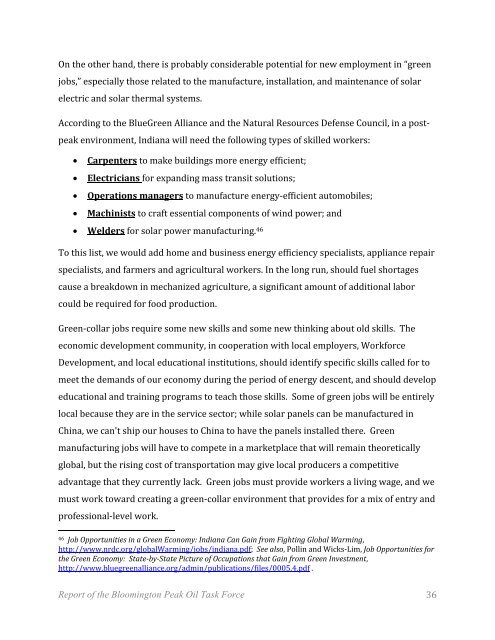Peak Oil Task Force Report - City of Bloomington - State of Indiana
Peak Oil Task Force Report - City of Bloomington - State of Indiana
Peak Oil Task Force Report - City of Bloomington - State of Indiana
You also want an ePaper? Increase the reach of your titles
YUMPU automatically turns print PDFs into web optimized ePapers that Google loves.
On the other hand, there is probably considerable potential for new employment in “green<br />
jobs,” especially those related to the manufacture, installation, and maintenance <strong>of</strong> solar<br />
electric and solar thermal systems.<br />
According to the BlueGreen Alliance and the Natural Resources Defense Council, in a post‐<br />
peak environment, <strong>Indiana</strong> will need the following types <strong>of</strong> skilled workers:<br />
• Carpenters to make buildings more energy efficient;<br />
• Electricians for expanding mass transit solutions;<br />
• Operations managers to manufacture energy‐efficient automobiles;<br />
• Machinists to craft essential components <strong>of</strong> wind power; and<br />
• Welders for solar power manufacturing. 46<br />
To this list, we would add home and business energy efficiency specialists, appliance repair<br />
specialists, and farmers and agricultural workers. In the long run, should fuel shortages<br />
cause a breakdown in mechanized agriculture, a significant amount <strong>of</strong> additional labor<br />
could be required for food production.<br />
Green‐collar jobs require some new skills and some new thinking about old skills. The<br />
economic development community, in cooperation with local employers, Workforce<br />
Development, and local educational institutions, should identify specific skills called for to<br />
meet the demands <strong>of</strong> our economy during the period <strong>of</strong> energy descent, and should develop<br />
educational and training programs to teach those skills. Some <strong>of</strong> green jobs will be entirely<br />
local because they are in the service sector; while solar panels can be manufactured in<br />
China, we can't ship our houses to China to have the panels installed there. Green<br />
manufacturing jobs will have to compete in a marketplace that will remain theoretically<br />
global, but the rising cost <strong>of</strong> transportation may give local producers a competitive<br />
advantage that they currently lack. Green jobs must provide workers a living wage, and we<br />
must work toward creating a green‐collar environment that provides for a mix <strong>of</strong> entry and<br />
pr<strong>of</strong>essional‐level work.<br />
46 Job Opportunities in a Green Economy: <strong>Indiana</strong> Can Gain from Fighting Global Warming,<br />
http://www.nrdc.org/globalWarming/jobs/indiana.pdf; See also, Pollin and Wicks‐Lim, Job Opportunities for<br />
the Green Economy: <strong>State</strong>by<strong>State</strong> Picture <strong>of</strong> Occupations that Gain from Green Investment,<br />
http://www.bluegreenalliance.org/admin/publications/files/0005.4.pdf .<br />
<strong>Report</strong> <strong>of</strong> the <strong>Bloomington</strong> <strong>Peak</strong> <strong>Oil</strong> <strong>Task</strong> <strong>Force</strong><br />
36









